

What are Corals? Ocean Alert: Overfishing. What happened to the Great Bank Cod. U.S. Fishermen Throw Away 2 Billion Pounds Of Fish A Year. Trawler nets the size of football fields. 50-mile longlines.
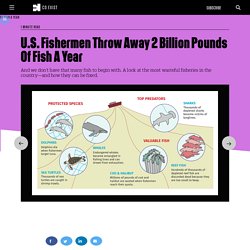
Gillnets two miles wide. These are the tools of the modern fishing trade, and the impact is indiscriminate. A lot of good fish reaches our tables. But a huge amount is also needlessly wasted, either discarded back overboard, or destroyed in-port. A new report from Oceana, a ocean conservation group, totals up the "bycatch" problem, and the numbers are fairly staggering. Below is an infographic summarizing the report, and naming the nine worst—as in most wasteful—fisheries in America.
Oceana is calling on the federal government to improve the counting at fisheries, including all unwanted catch. 10 Things You Can Do to Save the Ocean. 1.
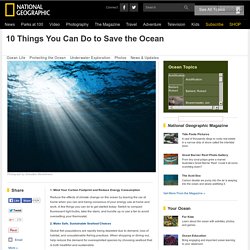
Mind Your Carbon Footprint and Reduce Energy Consumption Reduce the effects of climate change on the ocean by leaving the car at home when you can and being conscious of your energy use at home and work. 10 Ways to Help Save the Ocean. Meghan MacGillivray, Sarah Bedolfe, and Sarah Wilson | October 08 2012 The ocean is massive, and a lot of the problems facing it are too.
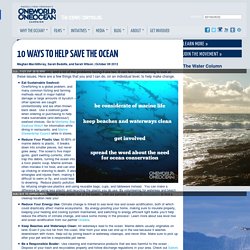
It can feel overwhelming to look at these issues. Here are a few things that you and I can do, on an individual level, to help make change. OVERFISHING. • Stop the Problem of Ocean Acidification Global warming has been a hot topic in the ocean world, and it is because of ocean acidification, known as 'the other global warming problem.' As the acidity of the oceans increases, it will have devastating impacts on marine life, including plankton, corals and shellfish, and the animals that eat them.

But you can do something about this problem right now - reduce global warming by taking simple steps that will likely save money in the long run - drive less, walk more, use less electricity and water - you know the drill. Lessening your "carbon footprint" will help marine life miles from your home. The idea of an acidic ocean is scary, but we can bring the oceans to a more healthy state with some easy changes in our behavior. 101+ Ways to Make a Difference ~ Solutions that Protect the Ocean. » Also recommended: Tips from Scientists to Help Polar Bears @ Polar Bears International Try to keep things in perspective.

Be mindful of the big problems, but focus on solving them through the things we can all do everyday to help reduce them. Develop a positive outlook: First, accept that you are only able to control your actions and responses to changing conditions around you.Take responsibility for your actions in all things. It sounds simple but being accountable to yourself will help you make the necessary changes.Stop to consider the consequences of your actions (if I choose to do this, what will be the result?). Shark Finning: The Shocking Truth. Stop shark finning. Shark Finning. Human beings are skilled at justification.

Every year humans slaughter over 100 million sharks yet we depict them as vicious and blood-thirsty killers. No more than 12 people a year are killed by sharks worldwide. Why Sharks Are Endangered — SEEtheWILD Wildlife ... Why Sharks Are Endangered Commercial Fishing The biggest threat to sharks, skates, and rays is the overfishing and over-consumption of their meat, fins, and cartilage.
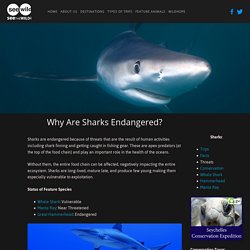
Shark fins are particularly sought after for traditional Chinese medicine and shark fin soup which is considered a delicacy in Asia. Attack Of The Giant Jellyfish (Documentary) Shark fin soup facts. Environmental impact of fishing. The environmental impact of fishing includes issues such as the availability of fish, overfishing, fisheries, and fisheries management; as well as the impact of fishing on other elements of the environment, such as by-catch.
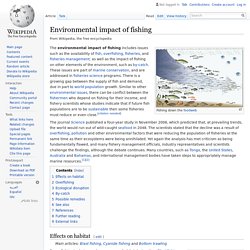
These issues are part of marine conservation, and are addressed in fisheries science programs. There is a growing gap between the supply of fish and demand, due in part to world population growth. Similar to other environmental issues, there can be conflict between the fishermen who depend on fishing for their income, and fishery scientists whose studies indicate that if future fish populations are to be sustainable then some fisheries must reduce or even close. [citation needed] Effects on habitat[edit] A sea turtle killed by a boat propeller Some fishing techniques also may cause habitat destruction. Effects of Overfishing on Wild Seafood Populations from the Seafood Watch Program at the Monterey Bay Aquarium. Large Fish Are the First to Go Fish that are large in size, live a long time and are slow to reproduce are among the most vulnerable to overfishing.
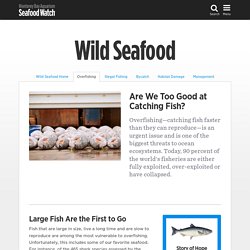
Unfortunately, this includes some of our favorite seafood. For instance, of the 465 shark species assessed by the International Union for Conservation of Nature, 74 are listed as vulnerable, endangered or critically endangered. Several species of rockfish—a group of Northeast Pacific fish also known as snapper that can live to be over 100 years old, were severely depleted by years of overfishing. Despite new and effective fishing restrictions, it will be decades before these long-lived fish recover. Global Consequences of Overfishing - International Fisheries. Overfishing is a global problem with many serious social, economic and environmental implications.
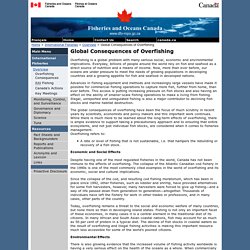
Everyday, billions of people around the world rely on fish and seafood as a direct source of nutrition and a means of income. Now, more than ever before, our oceans are under pressure to meet the needs of growing populations in developing countries and a growing appetite for fish and seafood in developed nations. Advances in fishing equipment and methods and increasingly large vessels have made it possible for commercial fishing operations to capture more fish, further from home, than ever before. Greater Cleveland Aquarium. Overfishing is simply taking adult marine life from seas and oceans at rates higher than the species can replace itself. It started as early as the 1800s when fisherman reduced the whale population to use the blubber for lamp oil. Over fishing is highly disruptive to the food chain and these depletions are one of the biggest catastrophes of the 21st century. Industrial fishing has reduced the number of large ocean fish by 10%.
Protect our fisheries. Livelihoods depend on it. Unsustainable fishing. As coastal and pelagic (open ocean) fisheries around the world have collapsed, fishing effort has shifted to the deep sea and previously unexploited fish species. Here, overfishing can quickly deplete local fish populations - even within a single season. Some newly fished populations, such as monkfish, Patagonian toothfish, blue ling, and orange roughy, have already collapsed in some areas. There is insufficient data on other populations to determine what level of fishing is sustainable. At present most deep-water species are likely to be over-exploited - and as many as 40% of the world’s fishing grounds are now in waters deeper than 200m. Office of Sustainable Fisheries.
Since 1996, NOAA Fisheries has reported on the status of U.S. fisheries, as required by the Magnuson-Stevens Fishery Conservation and Management Act. Overfishing. The Earth Times. Tuna at a fish market via Shutterstock Overfishing is a serious environmental issue and is essentially catching too many fish. This depletes the adult fish population and does not leave enough fish to breed and restock their numbers so that they can be sustainable. Overfishing: Worse than you might think.
Of all the threats facing the oceans today, overfishing takes the greatest toll on sea life—and people. What is overfishing? Overfishing is catching too many fish at once, so the breeding population becomes too depleted to recover. “Overfishing: A Threat to Marine Biodiversity.” UN News ... Overfishing · Tackling threats to the ocean · Australian Marine Conservation Society. Related Writings. SHOCKING: The Story of the Bluefin. Overfishing Rap.
STOP OVERFISHING! Project Ocean - Can We Save Our Seas? Overfishing. Ending Overfishing short version. Bluefin Tuna, Bluefin Tuna Pictures, Bluefin Tuna Facts. Why is overfishing a global concern? Overfishing - Revolution World Issue. List of threatened sharks. Third of open ocean sharks threatened with extinction. 25 June 2009 | International news release. Could sharks be heading for extinction? Sharks' troubles run deep. Shark. Great White Sharks. Shark Education - SharkWater. Obama to order ocean protections with executive powers, Kerry says. UK cod collapse due to overfishing and political failure, says fisheries expert. A global environmental problem, threat to our oceans and disaster. Ending Overfishing. How Bad Is Overfishing & What Can We Do To Stop It? Overfishing. Sharks at risk of extinction from overfishing, say scientists.
Sushi eaters pushing Pacific bluefin tuna to brink of extinction. The Earth Times. Overfishing Endangered Species. Overfishing Intro - Revolution. Bluefin Tuna. 10 Alarming Facts About Overfishing. Salt-Water Fish Extinction Seen By 2048. Overfishing Causes Extinctions of Local Fish Populations. Overfishing causes Pacific bluefin tuna numbers to drop 96% Ending Overfishing. Overfishing: Problems, Statistics, and Solutions. Shark Finning · Learn · Australian Marine Conservation Society. Overfishing. National Geographic. Overfishing.